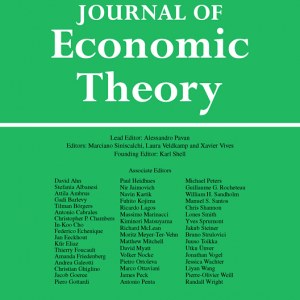
He, S., Offerman, T. and van de Ven, J. (2019). The power and limits of sequential communication in coordination games Journal of Economic Theory, 181:238--273.
-
Affiliated authors
-
Publication year2019
-
JournalJournal of Economic Theory
We study theoretically and experimentally the extent to which communication can solve coordination problems when there is some conflict of interest. We investigate various communication protocols, including one in which players chat sequentially and free-format. We develop a model based on the {\textquoteleft}feigned-ignorance principle{\textquoteright} according to which players ignore any communication unless they reach an agreement in which both players are (weakly) better off. With standard preferences, the model predicts that communication is effective in Battle-of-the-Sexes but futile in Chicken. A remarkable implication is that increasing players{\textquoteright} payoffs can make them worse off, by making communication futile. Our experimental findings provide strong support for these and some other predictions.